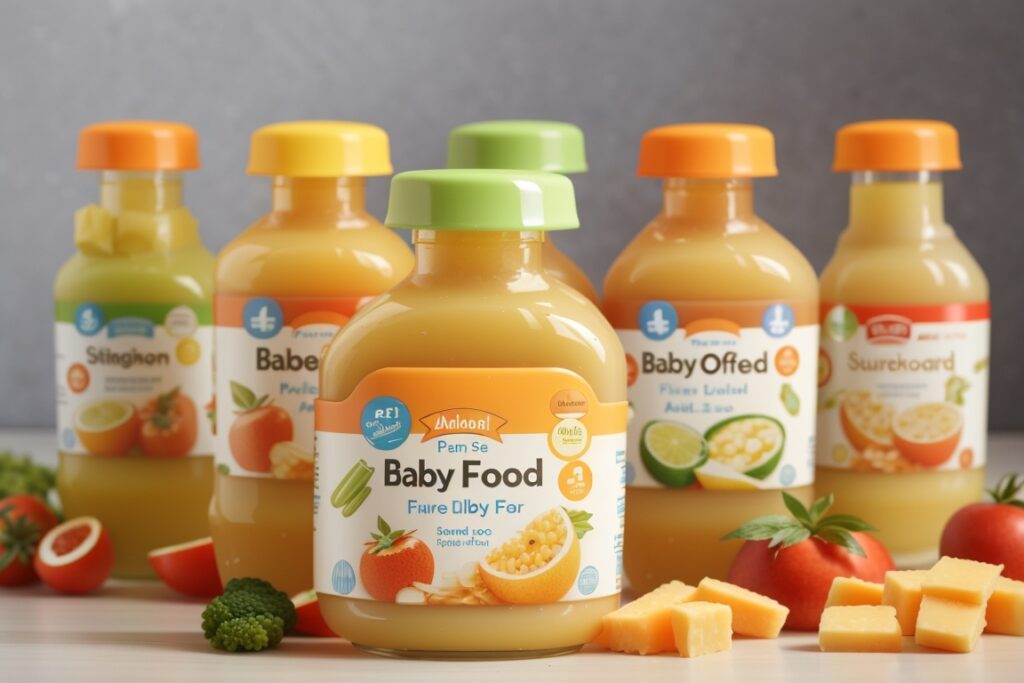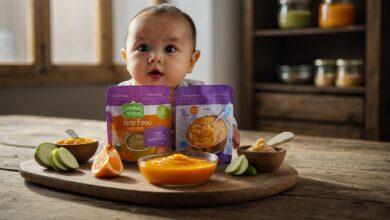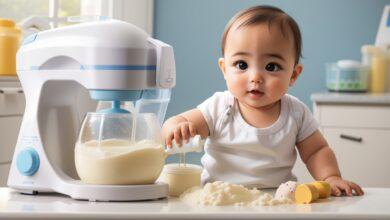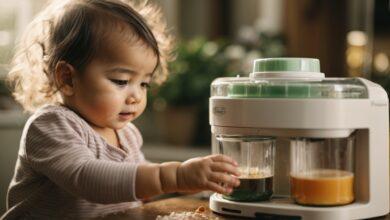Nurturing Your Little One: A Guide to Stage 3 Baby Food
Elevate Toddler Nutrition: The Benefits of Stage 3 Baby Food

Introduction to Stage 3 Baby Food
When it comes to nourishing your growing baby, transitioning to solid foods is a significant milestone. As your little one develops, their nutritional needs change, and it’s essential to offer them the right nutrients at the right time. Stage 3 baby food plays a crucial role in this journey, bridging the gap between purees and table food. In this guide, we’ll delve into the world of stage 3 baby food, exploring everything from understanding your baby’s nutritional needs to introducing allergenic foods safely.
Understanding Baby’s Nutritional Needs
As your baby continues to grow and develop, their need for nutrients beyond breast milk or formula increases. Stage 3 baby food provides the essential nutrition required for optimal growth. Introducing solid foods to your little one’s diet not only supports their physical development but also helps them explore various tastes and textures. As a parent, understanding the significance of stage 3 baby food is crucial for providing the best start for your precious bundle of joy.
Introduction to Solid Foods
The transition from a liquid diet to solid foods is an exciting and crucial time in your baby’s life. At this stage, your little one is ready to embark on a culinary adventure and expand their taste buds. Solid foods help develop their chewing and swallowing skills while providing valuable nutrients. Stage 3 baby food presents a new world of flavors and textures for your little foodie to explore.
The Importance of Stage 3 Baby Food
Stage 3 baby food serves as a vital stepping stone in your baby’s diet. As their taste preferences expand, it introduces more complex combinations and textures. These foods are designed to meet the increasing nutritional needs of your growing baby. Not only do they supply essential nutrients, but they also provide the opportunity to experiment with a wider selection of foods, encouraging a healthy relationship with eating.
Key Nutrients to Focus on
As your baby transitions to stage 3 baby food, it’s important to focus on specific nutrients to support their healthy development. Proteins, iron, calcium, vitamins, and minerals take center stage in your little one’s diet. These essential nutrients help build strong bones, support cognitive development, and boost the immune system. By paying attention to these key nutrients, you ensure that your baby gets the best possible start in life.
Transitioning to Stage 3 Baby Food
Transitioning your baby to stage 3 foods requires careful observation and an understanding of their developmental milestones. Here, we’ll explore the signs that indicate your little one is ready for this exciting phase of their culinary journey.
Signs of Readiness for Stage 3 Foods
Recognizing the readiness for stage 3 foods is essential to ensure a smooth transition and make mealtimes a pleasurable experience for both you and your baby. Look out for the following signs:
Motor Skills Development
Your little one’s motor skills play a significant role in determining their readiness for stage 3 foods. If they’re able to sit up with minimal support, hold their head steady, and reach for objects, they might be ready to explore chunkier textures and self-feeding.
Increased Appetite
As your baby grows, you’ll notice a gradual increase in their appetite. If they’re showing signs of still being hungry after consuming their current foods, it might be an indicator that they’re ready for more substantial and diverse meals offered in stage 3 baby food.
Ability to Chew and Swallow
Successful chewing and swallowing are critical skills for transitioning to stage 3 baby food. If your little one can effectively move food around their mouth and swallow without much difficulty, it’s a positive sign that they’re ready for the next stage of solid foods.
Recommended Age for Stage 3 Foods
While there are general guidelines for introducing stage 3 foods, it’s important to take into account individual variations in your baby’s development. Every baby is unique, and some may be ready for stage 3 foods earlier or later than others. Discussing this milestone with your pediatrician is highly recommended to ensure that your baby’s individual needs are met.
General Guidelines
In general, most babies are ready to embrace stage 3 foods between the ages of 8 to 10 months. However, remember that each baby develops at their own pace, and it’s essential to pay attention to signs of readiness rather than relying solely on age.
Individual Development Variations
Babies develop at different rates, and their readiness for stage 3 foods will vary. Some babies may show signs of readiness as early as 6 months, while others might not be ready until around 12 months. Observe your baby’s progress and consult with your pediatrician to determine the best time to start stage 3 foods.
Consulting with Pediatrician
Your baby’s pediatrician is your trusted partner throughout their developmental journey. Before introducing any new foods or making significant changes to their diet, it’s crucial to seek guidance from their healthcare professional. They will consider your baby’s unique needs and provide you with appropriate recommendations and advice.
Nutritional Options in Stage 3 Baby Food
As your baby enters the world of stage 3 baby food, exploring new textures and flavors becomes an exciting adventure. Here, we’ll dive into the various nutritional options available, and provide insights into choosing the best foods to nourish your little one.
Introduction to New Food Textures
Stage 3 baby food introduces a range of textures to your little one’s palate. Gradually transitioning to chunkier foods helps them further develop their chewing and swallowing abilities. Additionally, you can offer a variety of food combinations to expose them to new tastes and aromas.
Homemade vs. Store-bought Options
When it comes to stage 3 baby food, you have two options: preparing it at home or purchasing it from the store. Each option offers its own set of benefits, and it ultimately depends on your lifestyle, preferences, and the resources available to you.
Essential Nutrients for Optimal Growth
Giving your baby the right nutrients is crucial for their growth and development. In stage 3 baby food, focus on providing protein-rich foods, iron, calcium, vitamins, and minerals. These nutrients support healthy bone development, brain function, and immune system strength.
Introducing Allergenic Foods
Introducing allergenic foods to your baby’s diet can be daunting, but it’s an important step to help prevent allergies later in life. Understanding allergies and intolerances, knowing which foods to approach with caution, and following safety recommendations are key to introducing allergenic foods safely.
Preparing and Serving Stage 3 Baby Food
Preparing and serving stage 3 baby food is an opportunity to bond with your little one and ignite their love for wholesome, nourishing meals. In this section, we’ll discuss homemade baby food preparation techniques and provide guidance on selecting store-bought options.
Homemade Baby Food Preparation Techniques
Preparing homemade stage 3 baby food allows you to have complete control over the ingredients and the cooking process. Keeping a few key principles in mind ensures that your homemade meals are safe, nutritious, and enjoyable for your little one.
Store-bought Options: What to Look For
If preparing homemade baby food isn’t feasible for you, don’t worry! There are numerous store-bought options available that can provide the necessary nutrition for your baby. However, it’s essential to choose brands that prioritize nutritional value and quality ingredients.
Ensuring a Positive Feeding Experience
Mealtimes with your little one should be a delightful and positive experience. In this section, we’ll explore ways to encourage self-feeding skills, address common feeding challenges, and promote healthy mealtime habits.
Encouraging Self-Feeding Skills
As your little one develops their motor skills, it’s important to encourage self-feeding. Introducing finger foods, promoting hand-eye coordination, and gradually allowing them to explore their independence with food can foster healthy eating habits and encourage your baby to become an adventurous eater.
Addressing Feeding Challenges
Picky eating and food allergies are common concerns for parents during the stage 3 baby food phase. Understanding how to deal with picky eaters and handling food allergy concerns ensures that mealtimes remain a positive experience for both you and your little one.
Toddler Mealtime Etiquette
Teaching your baby about mealtime etiquette from an early age sets the foundation for a lifetime of healthy eating habits. Simple practices like eating together as a family, promoting mindful eating, and creating a pleasant dining atmosphere can make mealtimes enjoyable and foster proper table manners.
Summary and FAQs
Recap of Stage 3 Baby Food Essentials
In this comprehensive guide, we’ve explored every aspect of stage 3 baby food, from understanding the importance of solid foods to addressing feeding challenges. By prioritizing your baby’s nutritional needs, introducing new textures and flavors, and ensuring a positive feeding experience, you can provide your little one with a strong foundation for healthy eating habits.
Frequently Asked Questions
How can I ensure my baby gets enough nutrients with stage 3 foods?
To ensure your baby receives adequate nutrients at the stage 3 baby food phase, focus on providing them with a variety of protein-rich foods, iron and calcium sources, and a balance of vitamins and minerals. Offering a diverse selection of foods and consulting with your pediatrician can help you meet their specific nutritional requirements.
Are there any safety concerns when introducing allergenic foods?
When introducing allergenic foods, it’s important to follow safety recommendations. Start by introducing one allergenic food at a time, in small quantities, and observe your baby for any adverse reactions. If you have concerns or a family history of allergies, consult with your pediatrician for personalized guidance.
Should I continue breastfeeding while introducing stage 3 foods?
Breastfeeding continues to provide valuable nutrition and immune-boosting benefits even as you introduce stage 3 foods. It’s recommended to continue breastfeeding as long as it aligns with your baby’s and your family’s needs. However, every baby is unique, and consulting with your pediatrician can help you make an informed decision.
For more personalized guidance and information on stage 3 baby foods, don’t hesitate to reach out to your baby’s healthcare provider.






